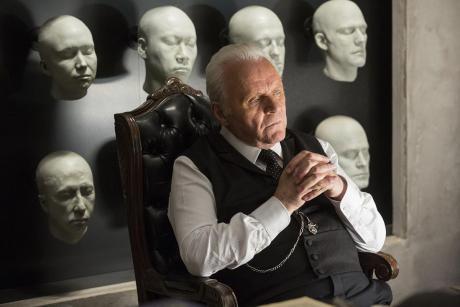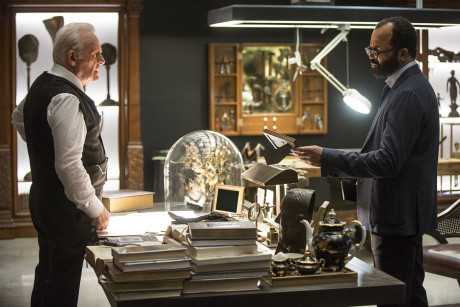Westworld 1.3: The Stray

Photo: HBO
Well, it seems all my theories from last week are wrong. Unless he’s a persuasive liar (and he may be), Dr. Ford doesn’t want to create life, and I doubt Dolores means anything to him. However, I found an excellent theory about the Man in Black, and why Dolores might mean something to him. You can check it out over at Beyond Westworld.
Now here are my thoughts about the third episode, “The Stray.” As usual, this post is loaded with spoilers and intended only for those who have already watched.
I’ve always liked the expression “ghost in the machine.” When I was a teenager, the Police put out an album by that name. When I asked what it meant, someone defined it for me just as the Urban Dictionary does:
When software or hardware is made to complete a specific function, but a small percentage of the tasks completed have an unexpected result which cannot be explained.
“I launched the game a million times through that shortcut, but this time it didn’t launch for some reason… must be a ghost in the machine.”
Of course, if you dig deeper, you’ll find the term dates back to 1949, when Gilbert Ryle used it to describe mind-body duality. If the human body is a machine, and you believe humans have souls, then what truly separates us from AI is a ghost, so to speak, rattling around inside our hardware.
Last night’s episode of Westworld reminded me of that expression. Dr. Ford (Anthony Hopkins) takes Bernard into his lab, giving viewers more hints about the park in the process. Bernard is concerned about an apparent glitch among some of the hosts. One went on a rampage, carrying on a strange conversation with a nonexistent person called “Arnold” the whole time. The name means nothing to Bernard, but Dr. Ford has an answer.
According to Dr. Ford (who may or may not be a reliable narrator), he created Westworld with the help of a partner named Arnold. Dr. Ford was the realist who understood the hosts were only machines, and always would be; Arnold was the dreamer who wanted to create consciousness, not just the illusion of consciousness.
Arnold believed imbuing AI with consciousness would require 4 factors. To illustrate the notion, Dr. Ford draws a pyramid split into 4 parts. At the bottom, MEMORY; above that, IMPROVISATION; above that, SELF-INTEREST; above that … blank. Bernard asks what belongs at the top. Dr. Ford says Arnold never found out. He died in the park, and while his death was called an accident, Dr. Ford’s words and demeanor imply it was murder. The obvious conclusion is, he got too chummy with an unstable host and paid the price.
But what if Arnold wasn’t murdered? Suppose he committed suicide, of a sort? What if Arnold decided Westworld needed an upload of human consciousness–his consciousness–to provide the pyramid’s apex? The “ghost in the machine?”

Photo: HBO
After all, when Dolores overcame her programming (which had prevented her from firing a gun) and “killed” her host attacker, it was a male voice in her head that said, “Kill him.” A voice I didn’t recognize. (Though if it did belong to the Man in Black or some other character, I’m sure other fans on the web will write about it soon, if they haven’t already.)
But if I’m right, perhaps that’s why the stray host spared Hughes by mysteriously bashing his own head in? To silence a similar murderous voice?
I look forward to learning more next week! Back to those revisions on Divorce Can Be Deadly . I’m making progress, I swear!
Filed under: Emma Jameson, TV, Westworld Tagged: Anthony Hopkins, BeyondWestworld, Ghost in the Machine, Man in Black, Westworld








Published on October 17, 2016 11:16
No comments have been added yet.
Stephanie Abbott's Blog
- Stephanie Abbott's profile
- 12 followers
Stephanie Abbott isn't a Goodreads Author
(yet),
but they
do have a blog,
so here are some recent posts imported from
their feed.



